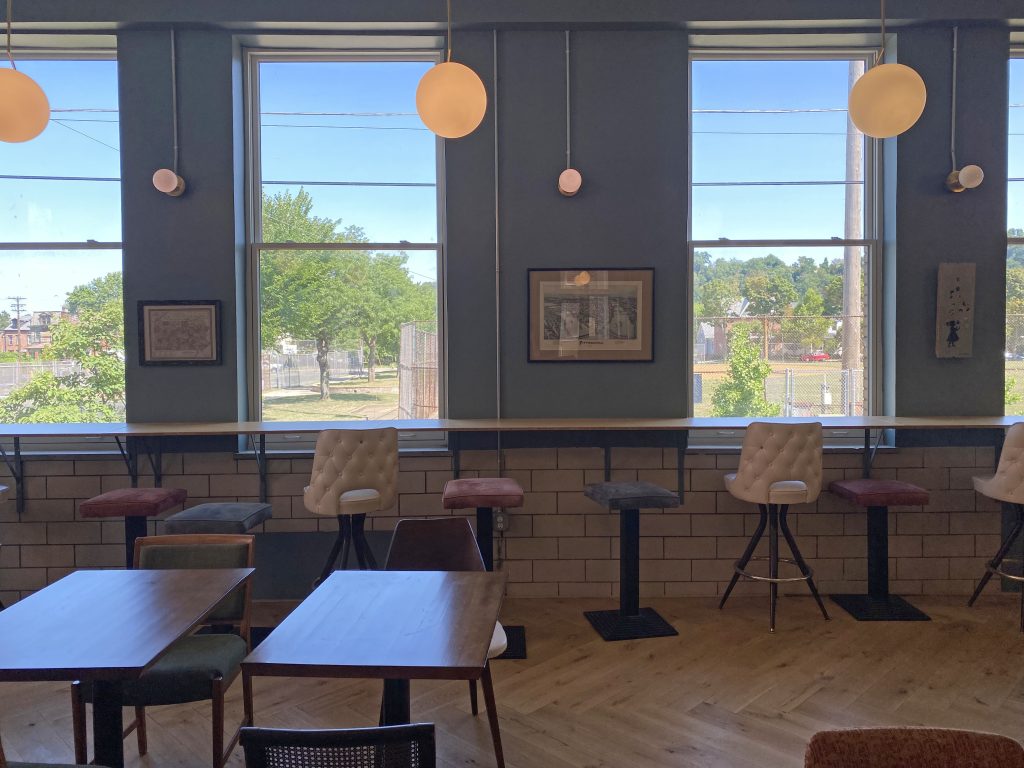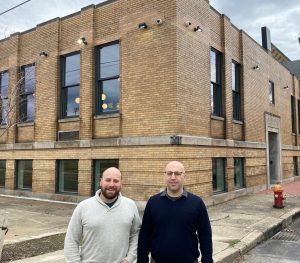
Layers of History: Adaptive Reuse With Financing Through Landmarks Community Capital

The café space at Fulton Common features original yellow brick along the interior perimeter of the building, and a white oak floor with wood sourced from the Allegheny Forest.
Brian and Irwin Mendelssohn, the brothers behind Botero Development, are no strangers to working with historic buildings. The duo owns a variety of redeveloped properties including Row House Cinema, a single-screen movie theater in what was once a narrow house, and the Lawrenceville Market House, a shared-retail space in a former Mellon Bank building across the street. When they set their sights on Manchester, it made sense that they’d choose a historic property.
A co-working and kitchen incubator space, Fulton Commons, was originally built as the St. Joseph’s Elementary School in 1947 and later housed St. Vincent de Paul offices, and Botero has paid homage to the yellow-brick building’s history by highlighting and supplementing its architectural and design features.
The brothers are drawn to historic buildings not only because of their interesting architecture, but also because of the challenge they present. When working with a new building, there’s a template in place, but with a historic building there are constraints that force you to add your own layers of history and beauty, Irwin Mendelssohn, explained recently.
Those “layers of history,” are easy to see in the features of the redeveloped historic building that is Fulton Commons. The building’s original features like its tin ceiling tiles uncovered during renovation; its yellow brick which runs around the perimeter of the space, and its 1940s-era classroom doors on select offices, offer it a distinctive historic aesthetic.
In addition to highlighting the building’s original features, the Mendelssohn brothers added a distinctive touch of their own to augment a sense of historic feeling to the building. This included wood floors made from white oak sourced from the Allegheny Forest and a touch of vintage décor. One set of arm chairs, for example, features repurposed fabric patches from Old Flame Mending, a Pittsburgh-based sewing service.
Fulton Commons, which opened in July 2020, in part, thanks to an $833,000 construction loan from Landmarks Community Capital— a non-profit lending subsidiary of the Pittsburgh History & Landmarks Foundation— is open to its members 24-hours a day.
The building features a combination of offices, dedicated desks, and open-seating options in six spaces, which range from Art Deco Miami- to 1940s-era Schoolhouse-style. The kitchen incubator at Fulton Commons is the largest shared kitchen space in the city and offers dedicated prep stations and storage space.
Located at 1546 Fulton Street, Fulton Commons is a contributing resource to the Manchester City Designated Historic District. Its adaptive reuse was financed in part by Landmarks Community Capital, a Community Development Financial Institution (CDFI), certified by the United States Department of the Treasury.

